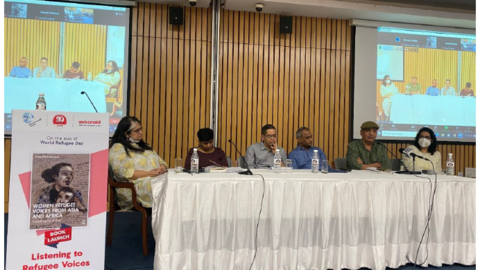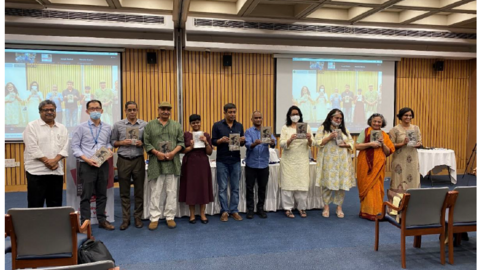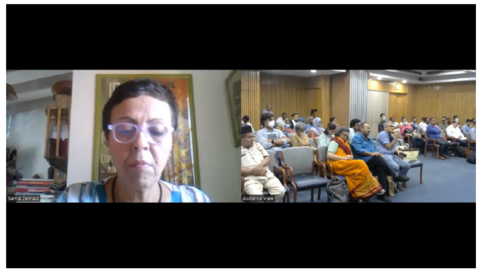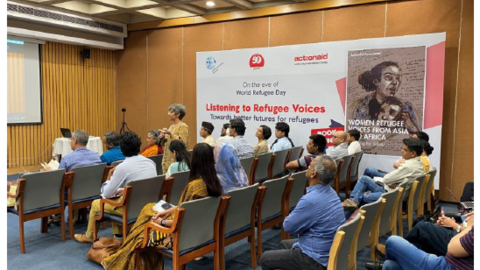Workshop: Listening to Refugee Voices: Towards Better Future for Refugees
Photo Gallery
Background
The number of people who have been forcibly displaced from their homes due to war, violence, persecution or environmental calamities have been on the rise in the past 10 years. Even during the pandemic, when movement restrictions were abound and the international community had appealed for ceasefires to facilitate COVID response works, the absolute numbers of displaced people has been rising. By the end of 2020, 8.24 crore people or more than 1% of all people globally, were forcibly displaced. This sharp rise means that 1 out of every 95 person on earth in 2020 were forcibly displaced compared to 1 out of 159 in 2010.
India also has a significant number of refugees and stateless people, although determining their exact number can be difficult due to the lack of substantial legal framework concerning identification and registration of refugees in India. As per UNHCR reports, there were more than 2.1 lakh refugees or persons of concern residing within India at the end of October 2021. The same report also suggests that there has been a rise in asylum seekers approaching UNHCR India due to violence and instability in neighbouring countries of India.
India although having a long history of receiving refugees, mostly from neighbouring countries and from African nations, is not a signatory to the 1951 Geneva Convention Relating to the Status of Refugees or its 1967 Protocol. Instead ‘refugees’ in India are often governed by the jurisdiction laid down under the Indian Foreigner’s Act 1946 and India’s Citizenship Act passed in 1955 and amended several times thereafter, most recently in 2019. This puts refugees and asylum seekers arriving in India under the same bracket of foreigners, immigrants or tourists depending on their citizenship document or the lack of it. Despite this, India at different points of her history has granted certain rights to refugees and asylum seekers belonging to specific groups like the Tibetan community or Tamil refugees from Sri Lanka.
The complicated legal framework under which refugees live in India creates access barriers to basic rights of nutrition, education, healthcare and livelihood. Field et al. (2019) states that even those who hold various valid documents like refugee cards and long-term visas often face difficulties with respect to their rights of residency, education attainment or access to sustainable livelihoods. They lack access to public services and face harassment as ‘illegal immigrants’ in the absence of knowledge of legal provisions. This forces many refugees to resort to the informal livelihood options where they work under inhuman conditions and face violence too. Refugee children too are engaged in such work.
The lack of widely accepted legal documents is one of the major challenges that the refugees face while trying to lead sustainable livelihood in India. The government of India grants refugee status on a case by case basis and asylum seekers coming from countries which do not share a border with India have to first register themselves with the UNHCR offices in India. Upon registration, the UNHCR provides them with a blue coloured document that states that their refugee status is under consideration, but this blue document is also of no use when it comes to access to housing, finance or communication services. In recent years, the lack of Aadhaar cards has become a major challenge for refugees in accessing bank accounts or mobile phone connections.
Women refugees are worse-off when it comes to access to basic rights of livelihood, nutrition, education, etc due to their social position at the intersection of gender and refugee status. Women and girls make up an estimated 48% of all forcibly displaced people worldwide. The everyday structural discrimination and violence that women and girls face across the world are further exacerbated in times of conflict and displacement. They are often targeted for sexual abuse and exploitation and face rampant gender-based violence, with little recourse to authorities and legal mechanisms. ActionAid Association’s 2021 work titled “Women refugee voices from Asia and Africa: travelling for safety”, highlights the structural challenges that women who are forcibly displaced face and the inadequacies of the response of governments and other stakeholders, irrespective of the country of origin, ethnicity, and religion of the refugee community.
Program
| Time | Session | Speakers |
| 2:30 PM - 2:45 PM | Registration | |
| 2:45 PM - 3:00 PM | Welcome Remarks | Kumkum Kumar, Head of Programmes, ActionAid Association |
| 3:00 PM - 5:00 PM | Seeking Refuge: Stories of Hope, Resilience and Challenge |
|
| 5:00 PM - 5:15 PM | Tea Break | |
| 5:15 PM - 5:30 PM | Video Screening Book Launch | |
| 5:30 PM - 7:30 PM | Women Refugee Voices from Asia and Africa |
|
| 7:30 PM onwards | Tea session |




